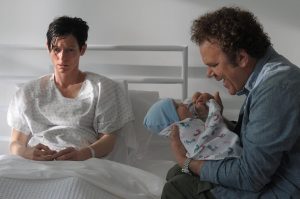We Need to Talk About Kevin (2011)

We Need to Talk About Kevin (2011), directed by Lynne Ramsay, is a psychological drama adapted from Lionel Shriver’s 2003 novel of the same name. The film explores the complex relationship between a mother, Eva (Tilda Swinton), and her troubled son, Kevin (Ezra Miller as a teen, Jasper Newell as a child). It delves deeply into the themes of maternal guilt, nature versus nurture, and the disturbing undercurrents of violence within the family. This is not a conventional thriller but a slow-burning psychological portrait of a family unraveling under the strain of an increasingly malevolent child.
Suggested videos for you:
Plot Overview
The narrative structure of We Need to Talk About Kevin is nonlinear, moving between Eva’s present-day life and flashbacks to Kevin’s childhood. In the present, Eva is a broken woman, ostracized by society and consumed by guilt. Through the flashbacks, we see Eva struggling with motherhood from the very beginning. Kevin, from infancy, exhibits manipulative, hostile behavior that Eva notices but can never quite explain. The tension between mother and son builds over the years, culminating in a horrific act of violence committed by Kevin as a teenager.
The film’s climax is devastating: Kevin orchestrates a massacre at his high school, using a bow and arrow, which leaves several students and a teacher dead. The aftermath reveals that Kevin also killed his father, Franklin (John C. Reilly), and younger sister, Celia (Ashley Gerasimovich). The final scenes focus on Eva’s visits to Kevin in juvenile detention, grappling with her own complicity, guilt, and whether Kevin’s malevolence was something she could have prevented.
Performances
Tilda Swinton delivers a tour de force performance as Eva. Her portrayal of a woman teetering on the edge of emotional collapse is haunting. Swinton masterfully conveys Eva’s exhaustion, isolation, and guilt, while still eliciting a sense of compassion from the audience. Eva is a deeply flawed character, often resenting Kevin from birth, which makes her an imperfect mother, yet her struggle is undeniably human. Her performance grounds the film, making it as much about Eva’s internal torment as it is about Kevin’s cruelty.
Ezra Miller is chilling as the teenage Kevin. He brings a cold, calculating presence to the role, his Kevin is deeply unsettling—a character who is acutely aware of the emotional and psychological impact he has on others, particularly his mother. Even as a child (played by Jasper Newell), Kevin exhibits a disturbing capacity for malice, which is depicted with eerie precision. Kevin is a mystery that remains unsolved, and that is perhaps what makes him so terrifying.
Themes and Analysis
At its core, We Need to Talk About Kevin explores the nature vs. nurture debate. Was Kevin born evil, or did Eva’s ambivalence toward him contribute to his development into a sociopath? The film does not offer any clear answers, leaving the audience to wrestle with the question themselves. Eva’s guilt and her attempts to understand Kevin’s actions are central to the film. The narrative is deliberately ambiguous, reflecting the messy, incomprehensible nature of real-life tragedy.
The film also examines the expectations placed on motherhood. Eva is an accomplished travel writer who feels trapped by her role as a mother, especially to a child as difficult as Kevin. The film implies that Eva’s resentment may have contributed to Kevin’s malevolence, but it also raises the question of whether any mother could have changed Kevin’s trajectory. This makes Eva a sympathetic character despite her many flaws. She is haunted not just by Kevin’s actions, but by the fear that she is somehow responsible for them.
The imagery throughout the film is heavily symbolic, particularly the repeated use of the color red, which appears in everything from jam smeared on a table to the blood of Kevin’s victims. Ramsay uses these visual motifs to evoke a sense of dread and foreboding, building tension even in the quieter moments of the film.
Direction and Cinematography
Lynne Ramsay’s direction is masterful. Her use of fragmented, nonlinear storytelling effectively mirrors Eva’s fractured psyche. The film moves fluidly between past and present, but the transitions are often jarring, underscoring the disorientation Eva feels as she tries to piece together what went wrong. Ramsay’s direction avoids sensationalism, focusing instead on the emotional and psychological toll of Kevin’s actions on his family, particularly Eva.
The cinematography by Seamus McGarvey is stark and often uncomfortable. The suburban setting is shot in a cold, detached manner, reflecting the emotional distance between the characters. The use of close-ups and lingering shots of Swinton’s face captures Eva’s emotional isolation and the internalized pain she carries. The film’s color palette, dominated by muted tones with splashes of vivid red, heightens the sense of dread that permeates the film.
Reception
We Need to Talk About Kevin was met with critical acclaim upon its release. Tilda Swinton’s performance was universally praised, and many critics lauded Ramsay’s sensitive and restrained handling of the subject matter. The film was nominated for numerous awards, with Swinton receiving nominations for Best Actress at the Golden Globes and BAFTAs.
However, the film is not without its detractors. Some viewers felt that its ambiguity and lack of clear resolution were frustrating, and the depiction of Kevin as a nearly inhuman figure has been criticized for lacking depth. His motivations remain inscrutable, which some believe undermines the film’s exploration of the nature vs. nurture debate. Others argue that the film’s portrayal of Kevin’s sociopathy is too one-dimensional, making him more of a symbol of evil than a fully fleshed-out character.
Conclusion
We Need to Talk About Kevin is a haunting, psychologically complex film that lingers in the mind long after the credits roll. Its exploration of a mother’s guilt and the unfathomable nature of evil is both emotionally and intellectually challenging. While it may not provide clear answers, its strength lies in its ability to provoke thought and discussion. Tilda Swinton’s performance anchors the film, making Eva’s journey as much about personal redemption as it is about understanding Kevin’s actions. Lynne Ramsay’s direction, combined with McGarvey’s unsettling cinematography, creates a haunting and meditative look at tragedy, motherhood, and moral responsibility.
This is not an easy film to watch, but it is a powerful one, demanding a level of introspection from its audience as they grapple with the uncomfortable questions it raises.











